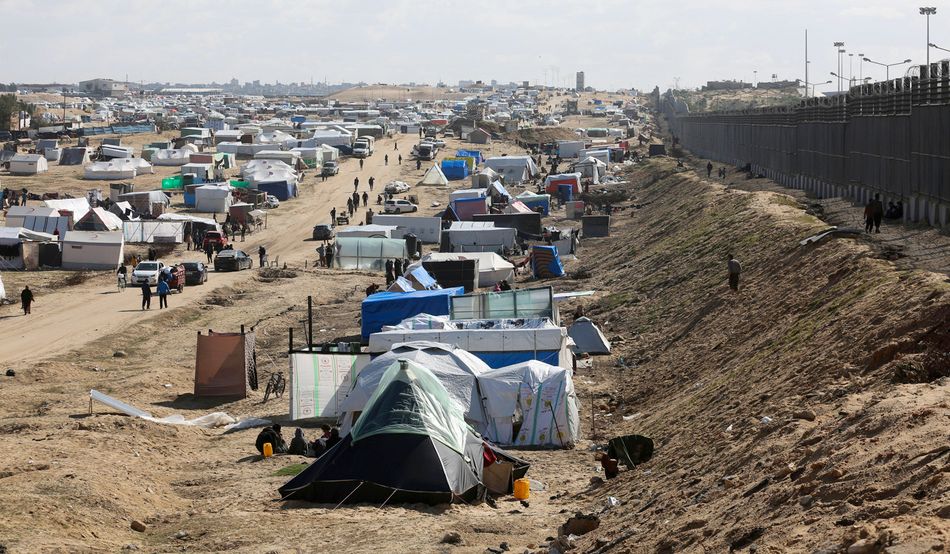They arrived under the cover of war, fleeing smoke, screams and the unmistakable sound of their collapsing homes. The border between Gaza and Egypt—once tightly sealed—was reluctantly opened, and in the final months of 2023 the Rafah crossing became a narrow passage of hope and heartbreak.
For thousands of Palestinians, like me, this was the only escape from certain death, forced displacement, hunger and thirst. But what awaited them on the other side of the border was not sanctuary, but limbo.
Today, Gaza’s displaced in Egypt live in a state that cannot be described as refuge, nor as resettlement. They are ghosts in transit—visible yet unseen, heard yet unacknowledged, physically present yet politically absent.
These people are not just statistics in reports by humanitarian agencies. They are mothers who carry both the memory of children buried under rubble and the burden of keeping the surviving ones fed and safe. They are fathers who once held jobs, identities and dignity, now reduced to seeking refuge in a land that does not allow them to legally work, to enrol their children in schools, to access healthcare without unbearable cost. They are children drawing pictures of homes with no doors; only smoke and sky.
Since the 2023 war began, Egypt has become an unintentional host to an estimated 100,000 Palestinians from Gaza. Many entered on temporary medical permits or student visas. Some had left Gaza out of desperation, with no real future on offer.
The temporary shelters in cities like Cairo, Port Said and Ismailia have turned into semi-permanent spaces, often funded by personal savings that dwindle day by day.
Without legal status, Palestinians from Gaza living in Egypt exist without rights. They have no access to public education, no work permits, no path to residency. And crucially, no idea if or when they will be able to go home.
Displaced Palestinians in Cairo describe it as a second Nakba (the Arabic for “catastrophe”), but slower—“Here, we are not dead, but we are not alive either.” They escaped with whomever they could save from their immediate families, leaving behind many more—parents, siblings—and everything they ever owned. They didn’t have the financial resources to get them out too.
The Rafah border crossing, once considered a critical humanitarian lifeline for Palestinians fleeing the devastation of war in Gaza, has become a costly gateway. Families are reportedly paying thousands of dollars per person for the mere chance to cross into Egypt.
In the absence of a transparent and regulated system, a shadow economy has taken hold, turning desperation into a business. Meanwhile, thousands remain trapped under bombardment, because they can’t afford to flee.
The global community’s response to Palestinians here in limbo has been profoundly insufficient. Humanitarian aid trickles in: some food parcels, limited financial support, a few temporary shelters funded by NGOs and international organisations. But the more critical issues, such as legal protection, long-term resettlement pathways, education for children and recognition of refugee status, have been largely ignored.
The United Nations Relief and Works Agency (UNRWA), historically the backbone of Palestinian refugee support, is not officially mandated to operate inside Egypt for Gaza’s displaced. As a result, this population falls through the cracks. It is stateless even among the stateless.
European nations and the United States have vocally condemned the displacement yet offered no solutions for those now stuck outside Gaza. Arab states, meanwhile, with notable exceptions, have largely remained silent, wary of appearing complicit in the forced transfer of Palestinians from their homeland. Egypt, on the other hand, overwhelmed by its own economic crisis and political sensitivities, allows these displaced persons to stay, but not to live.
Displacement does not only destroy the past, it fractures the present and undermines the future before it begins. Gaza’s Palestinians are now caught between the trauma of war and the reality of exile. Families are split across continents. Some are stuck in Gaza, others are scattered across Cairo and Istanbul or waiting in limbo at consulates, hoping for asylum.
Children who once dreamed of becoming doctors or engineers now wonder if they’ll ever sit in a classroom again. Widows sleep in borrowed apartments, relying on strangers’ donations. Our children who spoke Arabic with a proud Gazan accent are beginning to whisper, afraid of being labelled as burdens, or outsiders.
Displacement is not just about movement, it’s about erasure—the erasure of routine, of dignity, of place. And if the world continues to ignore the plight of Gaza’s displaced in Egypt, and around the world, we risk erasing their story, too.
Displaced Palestinians are not asking for handouts. They are asking for recognition that they are not just collateral victims of war, but human beings with rights. These are basic human rights: to education, work, healthcare and, above all, to return.
Return is not just a political demand. It is a sacred principle rooted in international law and moral justice. The right of return is not extinguished by displacement. It is made more urgent by it.
If the international community claims to support peace and justice in Palestine, it must act immediately—not just to stop the bombings, but also to protect those whose lives have already been torn apart by the war. It must put an end to any forced displacement policies and advocate for long-term solutions that respect rather than diminish Palestinian dignity.
History will judge how the world responded to this chapter of the Gaza tragedy. The ghosts in transit in Egypt need to be seen, and to be heard.











